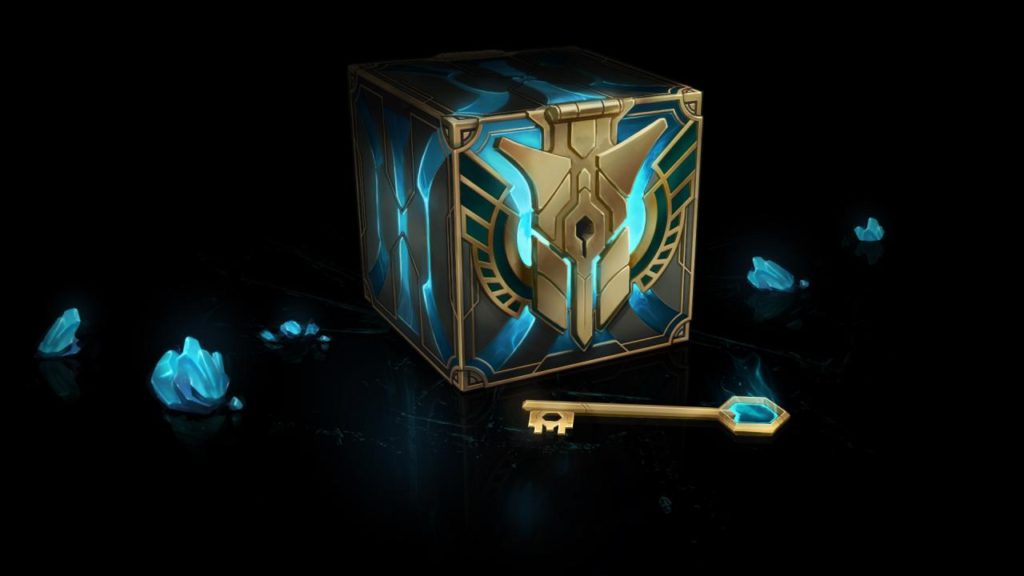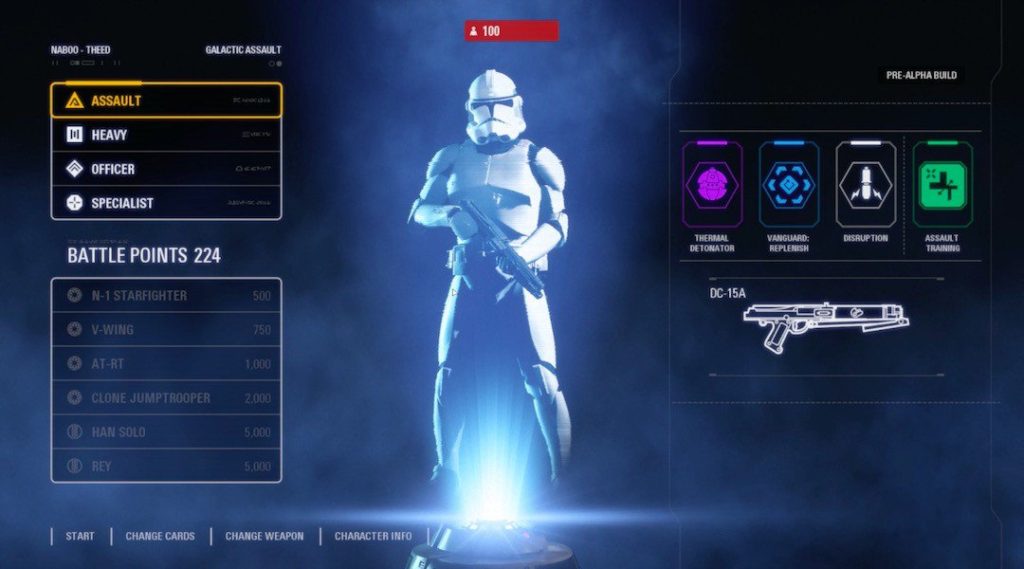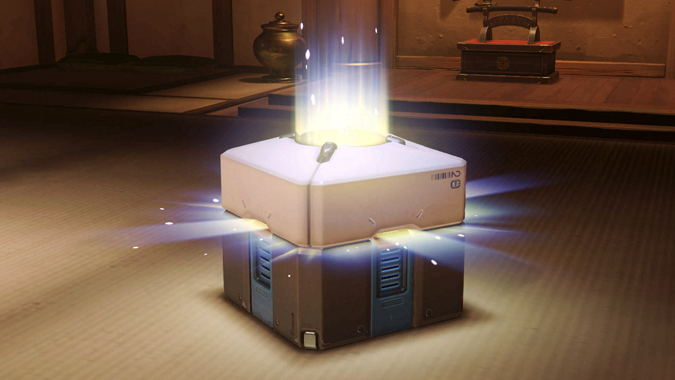The past few weeks the gaming world has been discussing the hot topic of loot boxes. Designed to reward the player with random in-game content, loot boxes are the staple reward system for many games, including heavy hitters like League of Legends and Overwatch. While these games implement loot boxes to dole out cosmetic rewards, a couple upcoming games are set to give players game-changing content via loot boxes. This shift in intention has many calling foul for the entire practice of loot boxes. Let’s take a look at loot boxes, and what they’ve done for the gaming community.
What exactly is a Loot Box?
Plain and simple, a loot box is an item a player can receive which contains in-game goodies. These can range from cosmetic upgrades like new skins and sprays for characters like in Overwatch, as well as extra in-game currency to purchase other upgrades. The key to the loot box is their randomness. Every time you open a loot box, you aren’t guaranteed anything: sometimes you’ll only get junk you don’t really want or need, and sometimes you’ll get a collection of stuff you were really wanting. Many equate loot boxes to slot machines: you pull the lever and hope for the best. I have only played a handful of games with the loot box system (i.e. Overwatch, Heroes of the Storm, League of Legends) but it seems like all games that offer loot boxes allow you to win them by doing certain objectives in-game, or by purchasing them with real world currency. This is where the controversy (kind of) starts.

Are Loot Boxes “Pay-to-Win”?
Pay-to-win is a term referring to a video game which allows the user to purchase abilities and upgrades with real money that would otherwise be locked behind a play wall. For example, the best guns in Destiny are found by playing the game and grinding for gear at high levels, but instead of playing for all that time just hoping to get a gun, you could just pay $10 and get the gun right away. I’m not sure if Destiny has a system like this, but you get the point. A player could easily pay some cash to get the best gear and then completely destroy other non-paying players since they’re all playing the same base game. Loot boxes inherently do not allow this practice since they usually offer non-game changing effects (like new cosmetic skins for your avatar).
However, EA’s upcoming Star Wars Battlefront 2 has stirred controversy thanks to a loot box system that rewards the player with more than just a new skin. In the game, players can purchase loot boxes (or earn them by playing the game), and inside the boxes are upgrades that can enhance damage, increase health, and give access to bigger, better weapons. Naturally many are upset since this means players who fork over the cash can easily dominate the play field since they’d have better gear sooner. EA has responded to this issue (the game is only in a beta stage as of this writing), but players do bring up a good point: loot boxes in Battlefront 2 are pay-to-win.
How do games handle Loot Boxes?
You would find it quite challenging to find anyone who would be in favor of pay-to-win loot box systems in video games. Assuming you’re asking the gamers themselves. For developers loot boxes seem to be a smart choice. They offer the players new content but don’t give them what they want. The players have a chance of getting it, and they can always pay more money to have another chance to get what they want, but never are they truly guaranteed to get what they desire. Benefit of the doubt to EA, they want to make money but don’t want to alienate any of their players who cannot pay for the best content right off the bat.
So how do you handle player progression, loot box systems, and paying for said boxes?

Let’s look at the history of loot boxes. From my experiences I’ve had a lot of fun grinding out loot boxes in Overwatch, hoping each time I pop one open it’ll contain a sweet item I’ve had my eye on. With events like the current Halloween Terror bringing with it exclusive skins and content you can only get for a limited time, the incentive to play and earn, or purchase new loot boxes is at a high. But I’ve always held back from buying. At the end of the day, the loot boxes don’t offer anything I don’t already have access too. They don’t have new weapons, just differently designed weapons. Sure, I want that Cthulu-inspired Zenyatta skin, but if I don’t get it I’ll live. Now, if the boxes contained items that changed how Zenyatta played, like a special weapon that increased damage, I would feel cheated if I didn’t have it when the window to earn it closed. But as it stand it’s not like that. And many people are now questioning if even that is fair.
So long as the loot box isn’t required to enjoy the game in the same tier as other players, they should be fine. Mobile games are excellent examples of games that entice you with new content, even better content, right outside your grasp via a loot box. Nintendo’s Fire Emblem Heroes is a gacha game where you use orbs to pull random heroes to join your party. Not every hero is made equally, with some being significantly better than others, encouraging players to put up real money to have the chance to have these better heroes. Again, you don’t need them to play or to win, but they make it way easier if you do have them. So what do you do? Probably pay some money for the chance to get what you want.
If this sounds like the slot machine analogy again, then we have to ask another question.
Are Loot Boxes gambling?
I read many articles this past week about loot boxes, and almost all of them touch on the topic of gambling. On the surface you might think loot boxes couldn’t possibly be gambling. Afterall, you don’t have to buy them. And for that matter, you can earn them simply by playing the game! What type of slot machine lets you play and earn money for free?
Well… all of them!
If you haven’t been to a casino then you might not fully understand the comparison. Casino’s give players small rewards just to get them in the doors. Take my grandmother for example. Every week she gets a free drawing at the casino to earn some money. She can receive anywhere from $5 up to $5000 every week. But the catch is you have to go to the casino to claim your prize. And more often than not she gets the lowest denomination. They check her ticket then hand her the cash, and she could go home with some extra spending cash. But she doesn’t. She uses is and sometimes hundreds more gambling since she’s already there.
This is the same practice game developers use with loot boxes.
They entice you with some free ones, or ones you earn from progression. After awhile you’ve grown accustomed to loot boxes, earning them, and not always getting what you want, but getting enough cool stuff to make you want to keep playing. How long would you go before you started to think you’re time was more important and you just handed over money to get loot boxes? How often have you thought while sitting at a slot machine that maybe this time you’ll bet more and you’ll hit the jackpot? It’s the same idea, except with loot boxes you don’t win money: you just win virtual items.
In a way, loot boxes are worse than slot machines.
Before you start calling out games as gambling, remember you don’t have to buy loot boxes. Just like how you don’t have to play in a casino. But this isn’t as easy for some. I’ve been able to go my entire gaming life without paying for a loot box, telling myself if I don’t get the special item I wanted that I still have other cool stuff to keep me happy. Have you any friends who have spent money on otherwise free-to-play games? How many stories are there of people spending hundreds on a game just to be let down they didn’t even get what they wanted in the first place? As terrible as it may sound, the winner is always the house, or in this case, the developer. While this certainly demonizes otherwise beloved companies (Blizzard, for example), it does give their players an avenue to get what they want assuming they have enough money.

How should Loot Boxes work?
Finally, let’s discuss how an effective loot box system should work. As established before, loot boxes should not give game changing content like ability upgrades or enhancements. Loot boxes should only give out cosmetic items that do not alter gameplay. That being said, I think a loot box system that does give content like Battlefront 2’s loot boxes could still work, but with some restrictions. If someone purchases content instead of earns it naturally, perhaps they should queue up in a separate group than those who have not purchased boxes. Or maybe there could be settings so players can earn more or less experience from playing with said players. In general something could be done to acknowledge the payed skill gap between players.
There isn’t any issue with loot boxes being purchasable with real world currency. If a player would rather have the items right off the bat, they can have access to that. However, a loot box system that also offers its users an alternative to get the items they really want would be useful. Take Overwatch for instance. If you get a duplicate item in a loot box, you’re given gold, which can be accumulated and used to flat out purchase the item you want. In this respect, you give the player three options toward the item they want: earn a loot box and hopefully pull it, purchase a loot box and hopefully pull it, or just say screw it after getting so much gold and outright buying the one you want. In this fashion it makes the player feel more in control of their game, while still giving the developers a way to earn some extra cash. Keep in mind, a game like Overwatch is free once you pay for the game: so all those updates, new characters, levels, and content need to get funded from somewhere.
Lastly, a loot box needs to feel worthwhile. While every game which utilizes loot boxes has tons of content to give out via the loot box, not all items are created equal. Every game has a rarity system, only giving out the most sought after and special items on occasion, and instead giving out the more mudane items in waves. But if all there is is mudane items, then it’s not worth your time. I think of this when I look at Blizzards Heroes of the Storm. Their loot boxes have tons of items, but the only ones I really want are the other characters. I think voice lines and narrators are cool and all, but they are way less exciting than a brand new character to play! Unfortunately for HotS, there are only 30’ish new characters, and literally hundreds of other items. Making matters worse, your loot boxes could also contain items for characters you don’t even have access too yet!
The future of Loot Boxes.
Where do we go from here? Loot boxes are here to stay. They bring in tons of money for the developers, and for games that are free to play, like League of Legends, they are the only source of income. The gaming industry learns from its players. If we respond to something we don’t like, the community will create backlash toward a game. Developers will listen, to a degree, to their players, and hopefully make some changes. EA has already said they will make some changes to Star Wars Battlefront 2’s controversial loot box system mainly because so many gamers came out and called foul. But with many other games successfully integrating loot boxes into their game’s core mechanics, it’s hard to fathom a future where loot boxes don’t have a place in gaming society.
Where do you stand on loot boxes? Do you think they’re a form of gambling? Are they limiting the player on items they otherwise should have access too? Let me know, and good luck!
Laters,
Jsick






